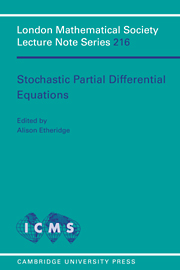Book contents
- Frontmatter
- Contents
- Foreword
- List of participants
- Stochastic differential equations with boundary conditions and the change of measure method
- The Martin boundary of the Brownian sheet
- Neocompact sets and stochastic Navier-Stokes equations
- Numerical experiments with S(P)DE's
- Contour processes of random trees
- On a class of quasilinear stochastic differential equations of parabolic type: regular dependence of solutions on initial data
- Fluctuations of a two-level critical branching system
- Non-persistence of two-level branching particle systems in low dimensions
- The stochastic Wick-type Burgers equation
- A weak interaction epidemic among diffusing particles
- Noise and dynamic transitions
- Backward stochastic differential equations and quasilinear partial differential equations
- Path integrals and finite dimensional filters
- A skew-product representation for the generator of a two sex population model
- A nonlinear hyperbolic SPDE: approximations and support
- Statistical dynamics with thermal noise
- Stochastic Hamilton-Jacobi equations
- On backward filtering equations for SDE systems (direct approach)
- Ergodicity of Markov semigroups
Backward stochastic differential equations and quasilinear partial differential equations
Published online by Cambridge University Press: 04 August 2010
- Frontmatter
- Contents
- Foreword
- List of participants
- Stochastic differential equations with boundary conditions and the change of measure method
- The Martin boundary of the Brownian sheet
- Neocompact sets and stochastic Navier-Stokes equations
- Numerical experiments with S(P)DE's
- Contour processes of random trees
- On a class of quasilinear stochastic differential equations of parabolic type: regular dependence of solutions on initial data
- Fluctuations of a two-level critical branching system
- Non-persistence of two-level branching particle systems in low dimensions
- The stochastic Wick-type Burgers equation
- A weak interaction epidemic among diffusing particles
- Noise and dynamic transitions
- Backward stochastic differential equations and quasilinear partial differential equations
- Path integrals and finite dimensional filters
- A skew-product representation for the generator of a two sex population model
- A nonlinear hyperbolic SPDE: approximations and support
- Statistical dynamics with thermal noise
- Stochastic Hamilton-Jacobi equations
- On backward filtering equations for SDE systems (direct approach)
- Ergodicity of Markov semigroups
Summary
Abstract: In this paper we first review the classical Feynman-Kac formula and then introduce its generalization obtained by Pardoux-Peng via backward stochastic differential equations. It is because of the usefulness of the Feynman-Kac formula in the study of parabolic partial differential equations we see clearly how worthy to study the backward stochastic differential equations in more detail. We hence further review the work of Pardoux and Peng on backward stochastic differential equations and establish a new theorem on the existence and uniqueness of the adapted solution to a backward stochastic differential equation under a weaker condition than Lipschitz one.
Key Words: Backward stochastic differential equation, parabolic partial differential equation, adapted solution, Bihari's inequality.
Introduction
In 1990, Pardoux & Peng initiated the study of backward stochastic differential equations motivated by optimal stochastic control (see Bensoussan, Bismut, Haussmann and Kushner). It is even more important that Pardoux & Peng, Peng recently gave the probabilistic representation for the given solution of a quasilinear parabolic partial differential equation in term of the solution of the corresponding backward stochastic differential equation. In other words, they obtained a generalization of the well-known Feynman-Kac formula (cf. Freidlin or Gikhman & Skorokhod). In view of the powerfulness of the Feynman-Kac formula in the study of partial differential equations e.g. K.P.P. equation (cf. Freidlin), one may expect that the Pardoux-Peng generalized formula will play an important role in the study of quasilinear parabolic partial differential equations. Hence from both viewpoints of the optimal stochastic control and partial differential equations, we see clearly how worthy to study the backward stochastic differential equations in more detail.
- Type
- Chapter
- Information
- Stochastic Partial Differential Equations , pp. 189 - 208Publisher: Cambridge University PressPrint publication year: 1995



